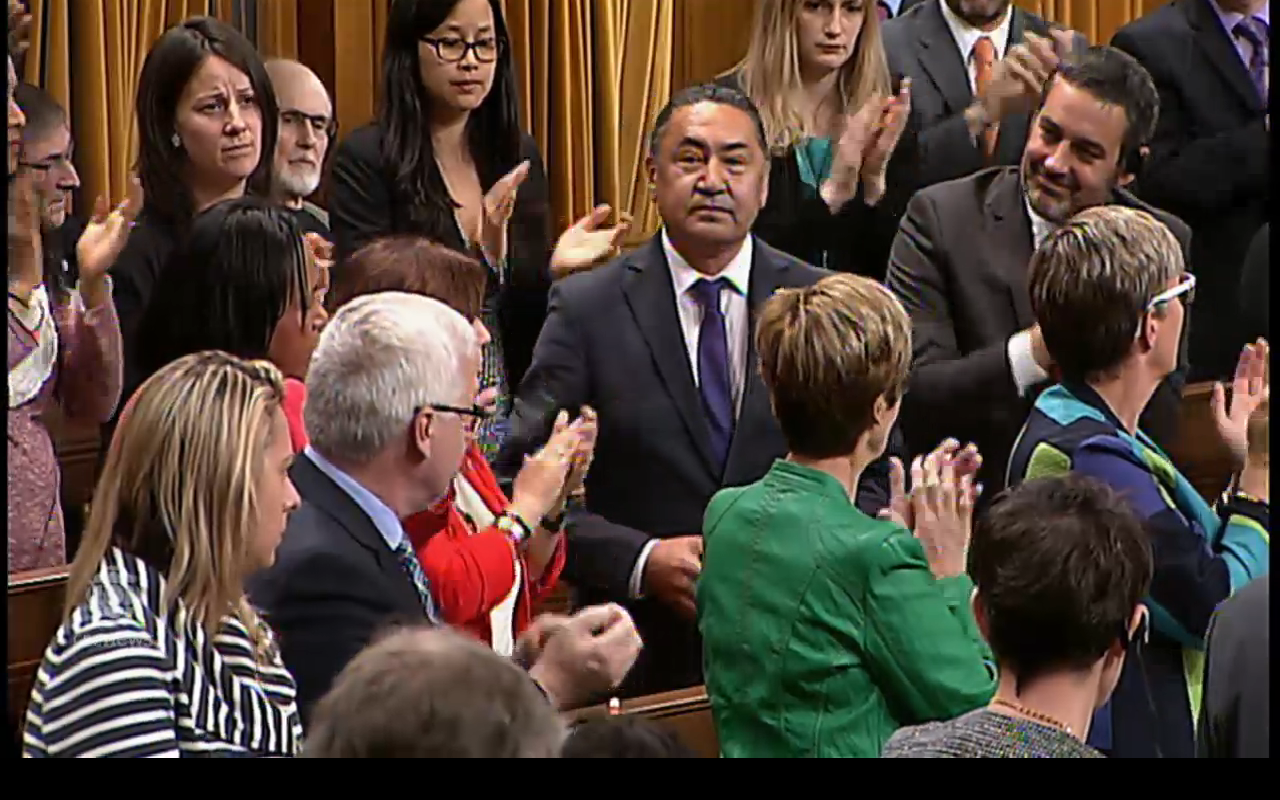Do you want to see more independent reporting from Parliament? Please chip in now to keep rabble.ca on the Hill!
Parliament is usually a sleepy, mostly empty place on a Friday afternoon; but this Friday, September 19, was an exception.
The NDP used a procedural maneuvre to force a full debate (and ultimately a vote) on the need for an inquiry on missing and murdered Aboriginal women and girls.
Most of the New Democrats were in attendance, and, when they realized what was happening, the Conservatives mustered a respectable number of their members. The Liberal benches were noticeably bare.
The NDP’s Roméo Saganash spoke personally and eloquently.
He related a story about his brother who died in residential school.
The family was not told about the death until more than two years later, the Cree MP from northern Quebec told the House. And it took forty years before they could find their lost loved one’s remains. Finally, Saganash said, his mother could have some kind of closure. That, he concluded, is why we need the national inquiry: to give closure to the thousands of grieving mothers, fathers, brothers, sisters and communities.
Just a ‘law and order’ issue. . .?
Environment Minister Leona Aglukkaq, speaking on behalf of the Conservatives, pointed out that she is an Aboriginal woman. She then spoke about a friend who was murdered by a man who had taken advantage of “house arrest” provisions, which her government has now changed.
The MP for Nunavut talked about other Conservative law and order legislation and the government’s Victims’ Bill of Rights, but, oddly, did not address the cultural issues related specifically to Aboriginal women who are victims of violence.
She treated the debate more as one focused on violent crime in general than on the disproportionate violence visited on Aboriginal women and girls.
It was the up to the Parliamentary Secretary to the Minister for the Status of Women, Susan Truppe, to tout the Harper government’s multi-year, multimillion dollar “action plan” to deal with missing and murdered women and girls.
As the London MP recited the list of Harper government measures it became clear that a number of the them, such as a missing persons’ DNA data bank, had no specific relationship to Aboriginal women.
While it expresses great sympathy to the families of the victims, the government seems to have difficulty seeing this issue as one of deep and systemic attitudes on the part of majority Canadian society.
NDP Deputy Leader Libby Davies spoke about those systemic attitudes, and dismissed the Harper Action Plan as a mere “series of projects.” She defined the tragedy of missing and murdered women and girls as a “failure to see Aboriginal women as citizens, as people.”
While the Conservatives want to reduce the issue to a simple matter of law and order, the fact of the matter is that there is much evidence that those who enforce law and order are, at times, not only “not a part of the solution,” they are a big part of the problem.
Sometimes the police are the problem not the solution
In 2013, the respected international agency Human Rights Watch issued a report on the relationship of the police with Aboriginal women in northern British Columbia.
That report was based on an extensive investigation the agency had carried out the previous summer, which included interviews with a number of First Nations women and girls who live along what has become known as the “highway of tears.”
Here is some of what rabble.ca reported, at the time, in this space:
“The report documents: ‘young girls pepper-sprayed and Tasered; a 12-year-old girl attacked by a police dog; a 17-year-old punched repeatedly by an officer who had been called to help her; women strip-searched by male officers; and women injured due to excessive force used during arrest.’ And that is not all. Human Rights Watch says it ‘heard disturbing allegations of rape and sexual assault by RCMP officers, including from a woman who described how in July 2012 police officers took her outside of town, raped her, and threatened to kill her if she told anyone.’ “
As Libby Davies put it, the missing and murdered women girls issue is “not about individual cases. It is about the justice system.”
On Friday afternoon, the NDP’s initiative took the government by surprise. But when the Conservatives discovered they did not have enough members present to defeat the Official Opposition’s last minute motion, they had the good grace to vote for it and let the debate happen.
The vote on whether or not to hold an inquiry will only come at a later date.
There was a time, believe it or not, when at least some Conservatives agreed with the national inquiry idea.
Conservative members of the House Aboriginal Affairs Committee at first supported the idea of an inquiry. Their support is reflected in the Committee’s preliminary report. The Prime Minister’s Office, apparently, read the riot act to the out-of-line government backbenchers and they then changed their tune — and the Committee’s final report.
After hearing all the facts that might emerge in this (unexpected and unscheduled) debate in the House, is there a chance the Harper government might consider changing its mind again?
Members of the Official Opposition do not think so. They promise, however to initiate such an inquiry within one hundred days of taking power, if they form the government after the next election.
Do you want to see more independent reporting from Parliament? Please chip in now to keep rabble.ca on the Hill!




